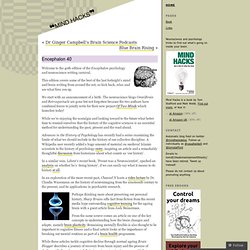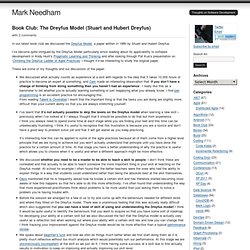

Research. Mind Hacks: Encephalon 40. Welcome to the 40th edition of the Encephalon psychology and neuroscience writing carnival.

This edition covers some of the best of the last fortnight’s mind and brain writing from around the net, so kick back, relax and see what fires you up. We start with an announcement of a birth. The neuroscience blogs OmniBrain and Retrospectacle are gone but not forgotten because the two authors have combined forces to jointly write for their new project Of Two Minds which launches today! While we’re enjoying the nostalgia and looking toward to the future what better time to remind ourselves that the history of the cognitive sciences is an essential method for understanding the past, present and the road ahead.
Sorting For Humans: Natural Sort Order. The Dreyfus Model. In our latest book club we discussed the Dreyfus Model, a paper written in 1980 by Stuart and Hubert Dreyfus.

I’ve become quite intrigued by the Dreyfus Model particularly since reading about its applicability to software development in Andy Hunt’s Pragmatic Learning and Thinking and after looking through Pat Kua’s presentation on ‘Climbing the Dreyfus Ladder of Agile Practices‘ I thought it’d be interesting to study the original paper. These are some of my thoughts and our discussion of the paper: We discussed what actually counts as experience at a skill with regards to the idea that it takes 10,000 hours of practice to become an expert at something, and Cam made an interesting observation that ‘if you don’t have a change of thinking from doing something then you haven’t had an experience‘. I really like this as a barometer to tell whether you’re actually learning something or just reapplying what you already know. I find pair programming is an excellent practice for encouraging this.